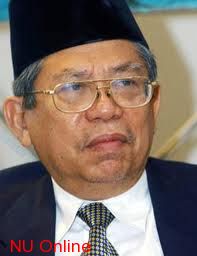Jakarta, NU Online
A recent spate of heists and robberies to fund terrorism has highlighted the sinister nexus between violent extremism and crime. In May, Indonesian counterterrorism police broke up a cell led by Abu Roban, who was slain during the raids. <>
The group was linked to Santoso, leader of the Islamic Mujahid in Eastern Indonesia, and relied on fa'i – stolen money – to support their activities in Poso, National Police spokesman Boy Rafli Amar said.
According to Boy, Abu Roban obtained billions of rupiah from robberies, including Rp 500m ($51,200) from the BRI Bank in Grobogan, Central Java, Rp 500m from the BRI Bank in Batang, Central Java, and Rp 450m ($46,000) from BRI Bank Lampung.
Police seized 4 kg gold and Rp 30m ($3,100) cash during their raid of his hideout in Batang, Central Java.
"The police still have to trace the money from the robbery. They are also still trying to identify the perpetrators of the robbery and how they are funnelling money from the robbery to their group," he said.
Crime in the name of jihad
Terrorists believe that stealing money is part of jihad, according to analysts.
"Money from robberies is mostly to fund the operations of the terrorist groups, including to buy guns, chemicals for bomb assembly, building new camps, and operational costs of their training," Noor Huda Ismail, a terrorism expert and founder of the Institute for International Peace Building, told Khabar Southeast Asia. "They value the heists and robbery as war for Allah."
"The involvement of terrorists in many crimes for jihad is not a crime for them. But that is not what our religion teaches us," said Subekti, an imam in Bandung, West Java. "Islam never allows anyone to do a jihad while at the same time harming people."
According to religious scholars, this is a grave error.
Terrorist groups are misleading others and misinterpreting Islam, Indonesian Ulema Council (MUI) leader Ma'ruf Amin told reporters on May 10th."Their actions cannot be justified in Islam," he said.
The MUI opposes any acts of terrorism, and violence for jihad that harms people and communities, he said.
"They have a wrong understanding of Islamic teachings. Therefore we Islamic scholars and religious leaders will continue to work on this so all Indonesian Muslims will understand the difference," Ma'ruf told Khabar.
Old method, different groups
Terrorists have relied on fa'i before. The 2000 Christmas bombings, and the 2002 and 2005 Bali bombings, were all financed by robberies, intelligence analyst Dino Crisbon said.
"The Bali bombing was financed by the Rp 400m ($40, 900) stolen from gold shops in Serang, Banten in 2002 by Abdul Rauf, Andri Octavia and Imam Samudra," he told reporters.
The second Bali attacks involved Rp 80m ($8,170) from robberies conducted at a cellular phone store in Pekalongan, Central Java in September 2005 by Subur Sugiarto, Ubeid and Ali Zein.
"They do random acts of robbery, mainly in small towns. They may think such places have less security," said Wiwit Wicaksono, a resident of Tangerang, West Java. He urged police to increase their vigilance, and community members to get involved.
Wiwit said youths should focus on proper teachings of Islam, tolerance and community safety.
Editing by Sudarto Murtaufiq
Terkait
Terpopuler
1
Panduan Shalat Gerhana Bulan Petang Ini, Mulai Niat hingga Salam
2
PBNU Instruksikan Qunut Nazilah Respons Agresi Israel-AS ke Iran
3
Jadwal Cuti Bersama dan WFA Lebaran 2026, Total Libur Capai 16 Hari
4
Ketua Umum PBNU Mengutuk Serangan AS-Israel atas Iran
5
Khutbah Gerhana Bulan: Tanda Kekuasaan Allah dan Kesempatan Beramal Saleh
6
Amalan-amalan yang Dianjurkan ketika Terjadi Gerhana Bulan
Terkini
Lihat Semua



